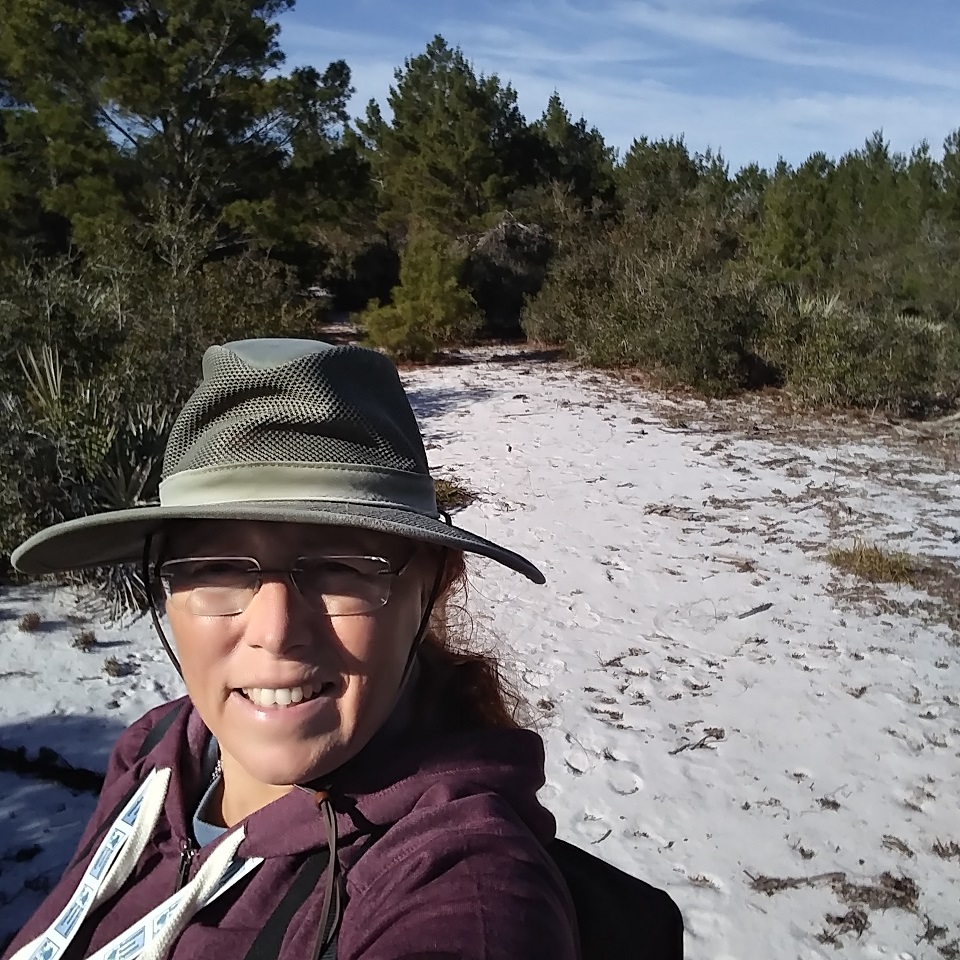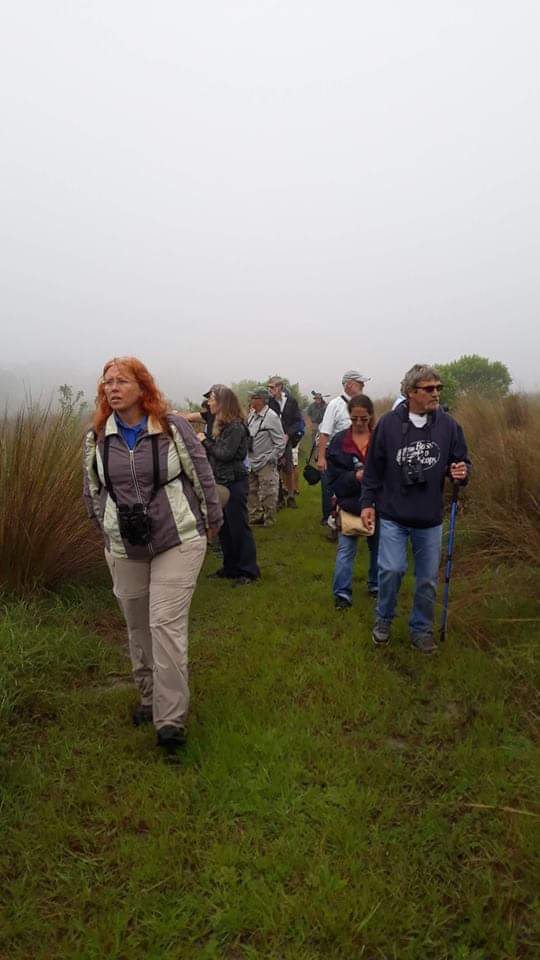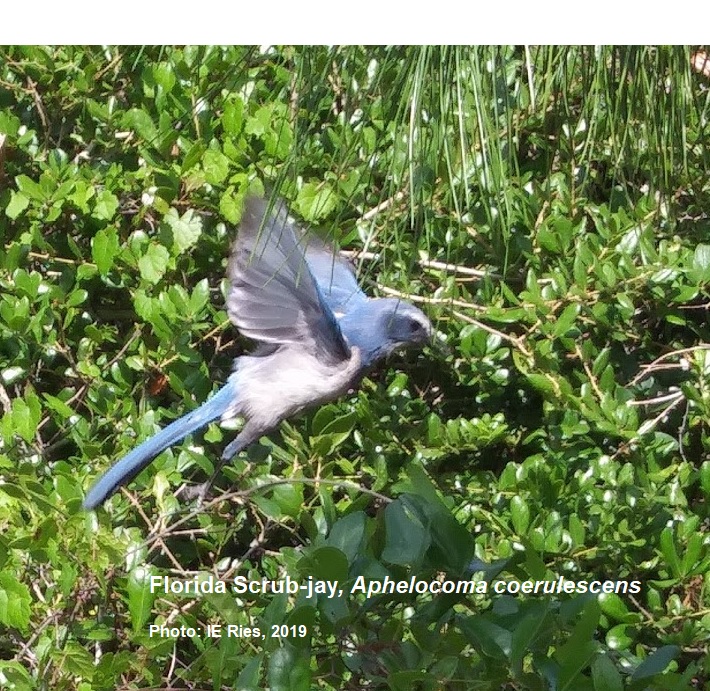
The Florida Master Naturalist marks an important 20th anniversary in 2021. We’re highlighting successes of the Florida Master Naturalist Program (FMNP) as part of this celebration. This blog features my interview with Florida Master Naturalist Eva Ries – Associate Instructor and FMN Program graduate. Eva Ries can be reached at avian@onemoregeneration.org. Learn more about FMNP, view the first blog post here.

Ken: Hi Eva. We have known each other for many years. We first met when you took Master Naturalists courses in St. Lucie County and we brought you onboard as an Associate FMNP instructor. You are the Director of Avian Research for OneMoreGeneration.org, have served on the Board of Directors for the Audubon Society chapters in both St. Lucie and Martin Counties, and function as St. Lucie County Public Lands Coordinator for Audubon Florida’s JayWatch. Please give readers a brief background of what you do and what your interests are.
Eva: Hi Ken, thanks for having me. Depending on which organization I’m representing, my activities vary: environmental educator, wildlife monitor, environmental advocate, and public representative for concerns about wildlife and ecosystems. My professional interests are wildlife, avian ecology, and conservation, in Florida and elsewhere. And, public education is one avenue through which I pursue these interests. My role with OneMoreGeneration also allows me to assist the public in a specific and unique way when the organization becomes the “complainant of record” on a witnesses’ behalf to shield them from possible reprisal(s) when reporting potential environmental or wildlife related offenses.
Ken: You’ve always impressed me with your knowledge and love of all things “birds”. You’ve also taught ethics as a Master Naturalist Associate Instructor. I know you have a special affinity for our endemic Florida Scrub-jay. Please let readers know how you have been able to share your interest in that species with Master Naturalists and how ethics comes into the picture.
Eva: Thank you! I’ll share with readers that my life-long role model has always been David Attenborough. Watching his educational programs and interviews and reading his books instilled in me what it meant to both be a naturalist, but also how to properly interpret and teach others responsibly and ethically. That underlying realization meant, to me, there’s a difference between genuine environmental education versus simply using the natural world as “interesting entertainment.” Discerning the difference requires both realization and commitment on the part of the naturalist.
Over the years, it became more and more obvious that residents and visitors misunderstood the Florida Scrub-jay, and then interacted with this species in ways which are detrimental to the birds, and which violates state law, too. Providing education through interpretation and the presentation of research by experts helps dispel one of the most problematic myths held by the public about the Florida Scrub-jay.
The myth is that this particular species is naturally “friendly” towards humans to the extent that birds will attempt to land on humans seeking food. This isn’t “natural” behavior, it’s habituation. In this case, the habituation is in the form of conditioning these birds to accept food from humans, bringing Florida Scrub-jay close to humans.
Readers, please do not feed the Florida Scrub-jay. Doing so places the Florida Scrub-jay in harm’s way, contributes to nest failures due to the foods they are accepting, and violates state law.
Ken: How did participation in the Florida Master Naturalist Program help you?
Eva: It offered me an opportunity to study Florida’s ecosystems with seasoned instructors, and then combine newly acquired knowledge with existing knowledge. Interpreting and presenting through instructional systems design methodology made me a better interpreter, curricula designer, and educator, generally.

Ken: Not only are you a graduate of the Florida Master Naturalist Program, but you are also Associate FMNP instructor. Do you feel connected to a larger community of Florida Master Naturalists and UF?
Eva: Absolutely. I “found my people,” so to speak, and got to know counterparts around the county and throughout Florida through the Program. “It’s a small world, after all!” took on new meaning for me!
Ken: Can you describe one or two of the most memorable things you’ve done through the Florida Master Naturalist Program as an associate instructor or student?
Eva: Seeing experimental oyster reefs for the first time, up in Brevard County with instructor Holly Abeels. I’d not seen a restored oyster bed before. Working on my Coastal Systems module project included surveying of the public to assess knowledge regarding sea turtle lighting ordinances on county beaches. It helped me realize that public education is an on-going endeavor, and helped this Extension Office because the resulting data could be used to improve public outreach efforts.
Ken: Your home is along the north fork of the St. Lucie River. Please tell readers how important water quality in this estuary is to you personally.
Eva: In 2009, I could stand on my dock at high tide and clearly see the river bottom. But that was the last time. The following year, the heavy turbidity began and never relented. Since then, the river’s appearance is muddy instead of clear and tea-colored. The mullet used to jump prolifically, too. But now, days may go by before I hear even one joyful splash.
Every single human resident had a hand, over time, in turning one of the most bio-diverse rivers on the continent into a turbid, struggling waterbody because of decisions made on the individual and societal level. Stewardship means changing your decisions and behaviors to benefit the environment upon which we are all dependent because it’s the right thing to do. Maybe not easy, but morally necessary.

Ken: You are the St. Lucie County Public Lands Coordinator for Audubon Florida’s JayWatch and you have spent a lot of time studying our natural areas. Which county preserve is your favorite and why?
Eva: Putting me on the spot here because each is so unique! I’d have to say the Steven J. Fousek Preserve because fireflies can be still reliably seen there (at night), and our program participants can’t get enough of them (neither can I!). Plus, it’s got some of the best Florida Strangler Fig stands around.
Ken: What is your favorite Florida natural area? Why is it your favorite place?
Eva: Another favorite spot is the Richard E. Becker Preserve because of the proliferation of wildflowers. The Department has been busily restoring that site, and the native wildflowers are returning! The periwinkle lavender-blue of liatris species beginning in October is simply stunning, a must-see.
Ken: After participating in the Florida Master Naturalist Program, can you estimate how many people you’ve been able to teach about conservation issues?
Eva: It’s my hope there are many folks of all ages and from various communities near and far who I’ve reached through my roles with the Florida Master Naturalist Program, St. Lucie County Environmental Resources Department, and local Audubon Society chapters. As the St. Lucie County Environmental Resources Department made the decision to offer virtual programs due to COVID-19 safety protocols, accessible through the county’s website, that’s afforded ever-larger and wider audiences, including international viewers.
Between these activities, I hope at the very least, to have planted seeds of appreciation for the natural world in the minds of folks. The ultimate goal is for my environmental ethics and activities leads to improve stewardship in Florida and beyond well into the future.
Ken: The Florida Master Naturalist Program is celebrating its 20 Year Anniversary in 2021. Do you have any comments about this special anniversary?
Eva: It’s a credit to the state that the University of Florida developed and supported this program, preparing 20 years’ worth of environmental ambassadors, sending us out into the state. There, we helped teach the public, serve on advisory boards, offer environmental education, and perhaps serve as role models and mentors in our own communities. This is the gift that has the capacity to help Florida’s ecosystems survive under the pressures of ever larger human populations.
Ken: Is there anything else you would like to add?
Eva: Thank you for giving me the opportunity to reach a few more people to encourage them to look past the theme parks, nightclubs and beaches and fall in love with Natural Florida.

Eva Ries is a Florida Master Naturalist Associate Instructor, Land Steward, and Advanced Master Naturalist. She successfully completed the coursework below.
Coastal Systems, 2013 — Brevard County — Central East Region
Habitat Evaluation, 2015 — Monroe County — Southeast Region
Freshwater Systems, 2013 — St. Lucie County — Central East Region
Environmental Interpretation, 2014 — St. Lucie County — Central East Region
Wildlife Monitoring, 2014 — St. Lucie County — Central East Region
Conservation Science, 2015 — Miami-Dade County — Southeast Region
Upland Systems, 2014 — St. Lucie County — Central East Region
UF/IFAS Extension programs are open to all persons without regard to race, color, sex, age, disability, religion, or national origin.
The mission of the University of Florida Institute of Food and Agricultural Sciences (UF/IFAS) is to develop knowledge relevant to agricultural, human and natural resources and to make that knowledge available to sustain and enhance the quality of human life. With offices in each of Florida’s 67 counties, UF/IFAS Extension works to bring science-based solutions to the state’s agricultural and natural resources industries, and all Florida residents.
SolutionsForYourLife.com | @UF_IFAS An Equal Opportunity Institution
 3
3
